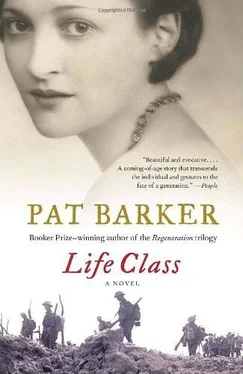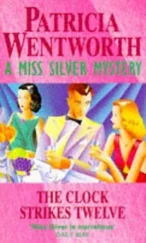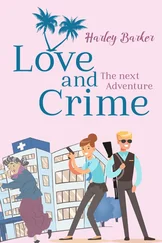How they dawdled, the two of them. Shifting from foot to foot, he waited while they got their things together and drifted towards the door.
‘Paul,’ Elinor said.
She looked delighted to see him.
‘Oh, hello,’ said Ruthie.
‘Elinor, can I talk to you for a minute?’
‘Yes, all right. We’re on our way to Lockhart’s.’
The café was crowded by the time they got there, the queue stretching from the counter to the door. As soon as he entered, Paul felt his face grow slick with steam and grease. Lockhart’s was cheap. Everything about it said cheap, from the smears of grease on the badly wiped tables to the brown crusts in the sugar where people had dipped wet spoons. Standing directly behind Elinor, he noticed how the hairs at the nape of her neck, fairer than the rest, crept into the centre, half covering the tender runnel of white flesh. When they first met, the nape of Elinor’s neck had kept him awake at nights.
Ruthie went off to join some friends, while Paul and Elinor found a table near the kitchen door. Paul had to squeeze himself close to the table to avoid being jolted by waitresses going in and out, but at least they were alone.
‘So,’ said Elinor, ‘what did Tonks have to say?’
‘I should stay to the end of term.’
‘Was that all?’
‘More or less.’ He didn’t want to tell her about having nothing to say, it hurt too much. ‘Common sense, really. I’ve paid the fees.’
‘Do you want to stay?’
‘Now, yes.’
‘Hmm.’ Her face was alight with curiosity. ‘How did you get on?’
‘With Teresa? Very well.’ He hesitated. ‘In fact I saw her home. She lives in a basement, did you know?’
‘No, I’ve never been. She always comes to see me.’
‘Mad, really. Anybody could get in.’
Elinor took a sip of her coffee and emerged with a line of foam on her upper lip.
‘Elinor.’ He patted his upper lip, aching to be allowed to do what Ruthie had done a few minutes earlier. Instead, he passed a white, folded handkerchief across the table. Elinor wiped the foam off on the side of her hand and handed his handkerchief back to him, still virgin.
‘Have you known Teresa long?’
He tried to keep the question casual, though just saying her name excited him.
‘Two years? She modelled for me when I was up for the scholarship. Free. It was very good of her and well, you know, it makes all the difference.’ Her eyes darkened. ‘She’s had a rotten life.’
‘The husband seems to be an absolute brute.’
‘He put her in hospital twice.’
‘Didn’t anybody do anything?’
‘No, of course not. He got off scot-free. Surprise, surprise.’
She sat back, withdrawing her warmth from him as if he too were tarnished by the universal male stain.
‘I’m surprised she doesn’t go home.’
‘He’d still find her.’
‘Yes, but at least she’d have family.’
‘An auntie. What’s the point of that? She needs six hulking big brothers. Besides, the work’s here.’
‘Modelling.’
‘Well, there’s not much call for it up north. I know it’s not much of a living, but —’
‘How much does it pay?’
‘You really do like her, don’t you?’
‘Ye-es. Yes, I do — only I’m not sure she’s actually finished with her husband. Finished finished.’
‘’Course she has, the man’s an absolute nightmare. No wonder she’s suspicious of men. And being a model doesn’t help.’ She stared at him. A lot of men think models are fair game.’
‘Neville.’
‘For one.’
He was remembering Neville’s story about the baby with a dozen possible fathers, though it had suited Neville to say that. ‘He seems to be an interesting chap.’
‘Oh, he’s that all right. Have you seen his latest paintings? They’re on in the Grafton Gallery.’
‘No, I haven’t. I’ll have a look.’
‘I don’t like the new stuff particularly, but there’s no denying it’s powerful.’ She was making patterns with the coffee dregs in her cup. ‘He knows exactly what he wants to do.’
‘I wish I did.’
‘So do I. Wish I did.’
‘You’re doing all right. Everybody seems to think you’ll get the scholarship.’
‘Yes, but it’s all schoolgirl stuff, isn’t it? There’s nothing there.’
So perhaps they were all dissatisfied with their work? Perhaps that was an artist’s normal state?
Elinor pushed her cup away. ‘Shall we get back, then?’
He said goodbye to her at the top of the basement stairs. She was a good friend. If he’d learned nothing else at the Slade he’d learned that men and women could be friends, even intimate friends, without sex intruding. But then, halfway down the stairs, she turned and looked back, and there he was again, a rabbit caught in the light of the gig lamps, unable to move or look away.
No, it was impossible. He couldn’t still be attracted to Elinor, not now, when all his thoughts were focused on Teresa. What on earth had possessed him to say Friday? He could equally well have said today or tomorrow, at least asked if she was free. As it was, he’d condemned himself to three whole days without her. Fool.
He didn’t have to look at the leaflet to know which paintings were Neville’s. They leapt off the wall. He’d done three studies of the Underground: streaks of light, advertisements, perpendicular lines that suggested strap-hangers, blurred heads and faces of people, everything fragmented, explosions of noise and speed. The sensation of noise surprised him, but it was the right word. These were very noisy paintings. Did he like them? He didn’t know, but he saw at once that this was fully mature work, streets ahead of anything he could produce. So far ahead and so different in its subject from anything he would ever want to paint that he was protected from envy. He got Neville’s address from Elinor and wrote a warm note of appreciation.
After posting the letter, he tramped up and down the streets around his lodgings, so absent that a scrap of paper blowing across the road startled him. Every time he thought of Teresa little flickering flames ran along his veins. In the end, because he couldn’t help himself, he went to her street. All around him, in the long mean terraces, was a sense of furtive, scurrying lives, of people living in one room, alone, cooking their suppers on a single gas ring. Walking down the street, he touched each railing as he passed, as a small child might have done, until he stood gazing down the basement steps at her front door. There was the familiar reek of rotting vegetables, but no red glow from behind the curtains. She was out. He was shocked by that. But then, why shouldn’t she be out? She had a whole life that he knew nothing about. He ought to go, but still he lingered, hoping she might somehow, miraculously, come round the corner. He was behaving like one of the peeping Toms she complained about and saw, abruptly, that the chasm dividing him from those pathetic, little men was no bigger than a crack in the pavement.
Back home, he wandered between the two rooms of his small flat, pausing to gaze out on to the railway lines through net curtains stiff with dirt. He sat on the edge of his bed, staring down at his clasped hands, and wondered where she was, and who she was with. This obsession grew like a tumour. One of those spongy excrescences that grow on the throat or the side of the neck and choke the life out of you. He was living his whole life, minute by minute, breath by breath, solely in the hope of seeing her again.
By the time Friday evening came he was exhausted, but kept going by the energy of his desire for her. They went to the Coliseum and sat in the front row of the balcony. He sat as close to her as he dared, aware of the curve of her shoulder and arm, of the vibration of laughter in her chest, far more conscious of her than of anything happening on stage, where a couple of grotesquely made-up men teetered about on high heels warbling like prima donnas. Normally he loved the music hall. What he liked best were the ‘turns’ — comedians, acrobats and jugglers — but most of all he was fascinated by the men in wigs and make-up and outlandish female costumes and by the young girls swaggering up and down, immaculately clad in white tie and tails. They seemed to turn the whole world upside down, to suggest anything was possible. In the music hall it was Twelfth Night every day of the year.
Читать дальше












